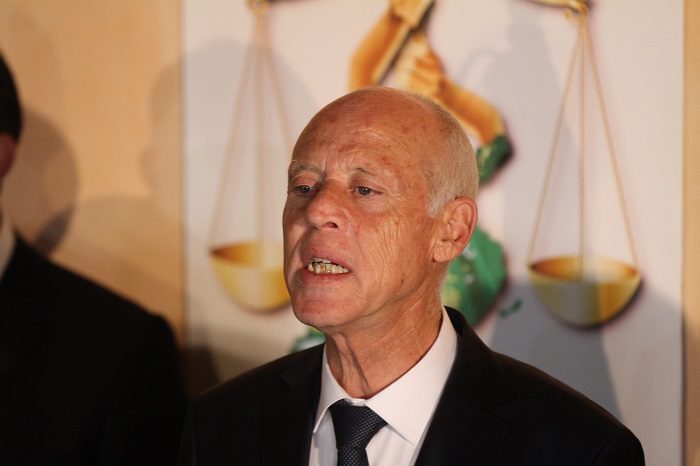Purging Tunisian Judges: Manufacturing a Vulnerable Judiciary

While overseeing a ministerial session on the evening of 1 June 2022, Tunisian President Kais Saied directed a speech toward the public. In it, he claimed that the Temporary Supreme Judicial Council (TSJC) had failed to purge the judiciary despite his repeated warnings. He announced that once the Council of Ministers approved, he would issue a decision amending his decree on the TSJC to give himself the power to dismiss judges. Furthermore, he would issue a list of judges supposedly guilty of financial corruption, moral turpitude, or issuing decisions that serve terrorism.
Hours later, a special issue of the official gazette was published containing the amendment decree and a list of 57 judges whom Tunisia’s ruler had decided to dismiss without a trial. Given the importance of these two texts in illustrating the judiciary that the president seeks to impose, they must be examined.
The President Amends His Decree: Total Power Was Not Enough
On 12 February 2022, Saied issued Decree no. 11 of 2022. He thereby abolished Organic Law no. 34 of 2016, replacing the Supreme Judicial Council that the latter had established with another, temporary council whose composition and competencies are set by him. To justify the measure, he cited rampant injustice and a need to purge the judiciary in order to address it. The decree defined the council’s composition in a manner that tightened the president’s control over it. It also made judges more vulnerable by allowing their removal in the absence of any disciplinary action. In this regard, Article 20 stipulated that “the president of the republic may request the dismissal of any judge who breaches his occupational duties” and that the TSJC must “immediately suspend” the judge concerned and “make a decision on the dismissal within one month”. However, if the TSJC missed the deadline or rejected the president’s request, he could make the dismissal decision unilaterally.
Less than five months after the establishment of a new judicial council in accordance with his vision, Saied amended Article 20. The new phrasing reads,
“The president of the republic, in the case of an emergency or a threat to public security or the country’s higher interest, and based on a reasoned report by the competent authorities, may issue an order to dismiss any judge whose actions could undermine the reputation, independence, or proper functioning of the judiciary. A public prosecution shall be initiated against every judge dismissed under this article. A presidential order to dismiss a judge may only be challenged once a final ruling on the acts imputed to him has been issued”.
To understand the motives behind amending the TSJC decree, the following should be noted:
Removing the Judicial Council from the Dismissal Process
The original version of the TSJC decree granted the president two powers: the power to ask the TSJC to dismiss judges, and the power to make the dismissal decision in its place if it rejects his request or fails to decide on the request in time. Although the president had submitted no dismissal request to the TSJC, the amendment removed the dismissal power from it and allowed him to exercise this power unrestrained upon receiving a report from the competent authorities. These authorities include all sources from which he can draw information, including the security agencies.
The justification for ignoring the TSJC when it comes to dismissals appears to be the principled opposition that its judges reportedly voiced when the idea was discussed with them. Hence, the president’s amendment is a legislative maneuver that spared him the embarrassment he would have faced had the TSJC (which he appointed) rejected his dismissals.
A Legal Trick to Deny Dismissed Judges the Right to Litigate
Saied is aware of the Administrative Court’s opposition to the use of dismissal as a means of manipulating measures for disciplining judges. In an attempt to avoid judicial decisions nullifying or staying the execution of dismissals, Saied included in his decree a legal trick: every dismissal automatically initiates a criminal prosecution and can only be challenged once a final ruling has been issued. Thus, the decree contains three major violations:
- It encroaches on the administrative judiciary’s jurisdiction to review the legality of administrative decisions, restricting it with a condition that appears in no previous legislation and conflicts with the principles of administrative justice in Tunisia and abroad.
- It infringes on the dismissed judges’ right to challenge their dismissals by requiring that they first wait for presumably long periods (namely for final rulings on the criminal cases that the decree requires to be initiated against them).
- It obligates the Public Prosecution to initiate a criminal prosecution against those dismissed without regard for whether there are legal grounds to do so. Many forms of misconduct that could underpin dismissal decisions are not criminal offenses. Likewise, the decree implicitly forces the Public Prosecution to continue prosecuting until a final ruling is issued.
Thus, the president – via a decree that he tailored to his own interests while ruling as a de facto autocrat – has deepened judges’ vulnerability and undermined their legal security, the most important pillars of which include the right to administrative litigation.
The Ease of Legislation
Irrespective of the amendment decree’s subject, the way it was announced, drafted, and presented to the Council of Ministers shows that Saied now believes that the law (even a law he himself enacted) is no obstacle to achieving his desires (including his quest to dismiss judges) because he can always amend it unilaterally.
Dismissal as a Message to Sitting Judges
In an apparent attempt to sway public opinion, Saied’s speech in front of his ministers expounded the actions imputed to the judges he dismissed, including financial corruption, illicit enrichment, and extramarital affairs. While the list included judges who actually are under prosecution for corruption crimes (including one who has been in custody for approximately a year), their names were highlighted to create the impression that all those listed are suspected of such crimes. Moreover, the list includes all the icons of Public Prosecution offices in the capital’s courts, which are known to have rejected the authority’s interference in the judiciary and refused to be harnessed in its wars on its opponents. This raises serious suspicions that the dismissals are political and intended to subjugate the judiciary.
The president’s persistent undermining of judges is an important political step that may pave the way for a new judicial creed that suits his political project – a project he has repeatedly called on “honorable judges” to join, thereby justifying fears for whatever rights and freedoms remain.



